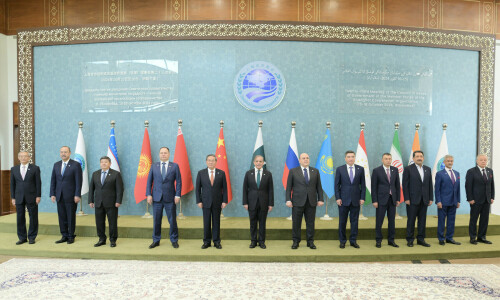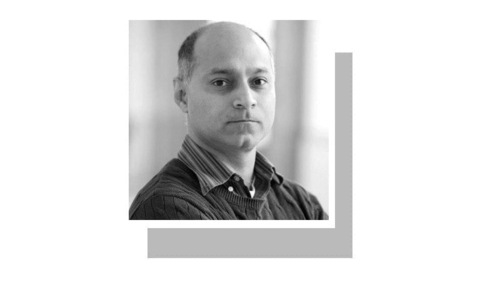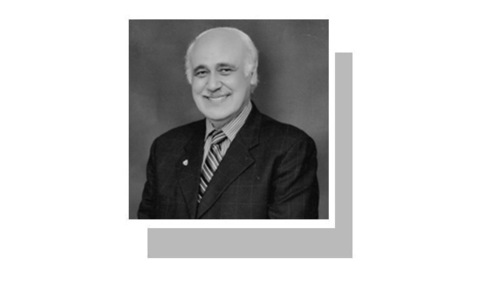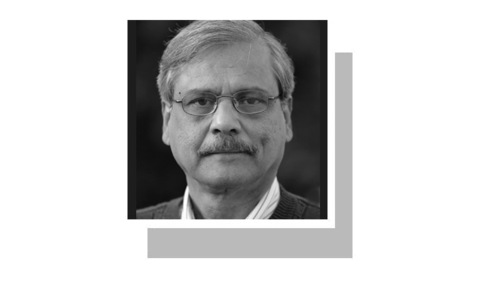ISLAMABAD, Feb 27: President Pervez Musharraf and the caretaker government came under more fire on the second day of an opposition-sought debate in the Senate on Wednesday amid voices of hopes that the next government of the winners of the Feb 18 elections would rectify the alleged wrongdoings of their predecessors.
Former prime minister Shaukat Aziz, who left the country before the elections and who was repeatedly referred to by opposition speakers as an “imported prime minister”, also came under severe criticism for allegedly pursuing a faulty economic policy and for current economic hardships of the people such as the prevailing inflation and food and power shortages.
The debate on the “overall political situation in the country”, which was marked also by charges of poll-rigging that the opposition said could not prevent a defeat of pro-Musharraf parties, will continue on Thursday morning, to be wound up in the evening by a minister of the caretaker cabinet, which was accused of pursuing the agenda of the previous one led by the Pakistan Muslim League (PML).
A day after the treasury benches were shocked by the formation of a rebel “like-minded group” of six of its members who could support the present opposition and the future ruling parties, some senators of the former ruling coalition had words of praise for the president and the government for holding what they called a free and fair election and promised to cooperate with the next government’s move for the welfare of the people and oppose those were not so.
There were no immediate signs of any further setback to the government in the Senate on a day the three main election-winning parties — PPP, PML-N and ANP — used a luncheon to demonstrate their big majority in the newly elected National Assembly that they said would be able to form the next government and eventually turn into a two-thirds majority in the 342-seat lower house after the award of special seats for women and minorities in proportion to their directly elected general seats.
In the midst of the debate, opposition Muttahida Majlis-i-Amal senators Rehmatullah Kakar and Kamran Murtaza questioned the appointment of interim Law Minister Syed Afzal Haider as a judge of the Federal Shariat Court and wanted to know who had prepared the summary, or proposal, for the notification issued before the elections.
The minister was present in the house at the time but preferred silence about the queries while Deputy Chairman Mir Jan Mohammad Jamali said Information Minister Nisar A. Memon could reply about the matter in his speech at the end of the political debate, which will be followed by one on the economic situation.
In the debate, Abdul Rahim Mandokhel of the Pakhtunkhwa Milli Awami Party said the election his Balochistan-based party boycotted as part of the All Parties Democratic Movement had become a “fraud and unconstitutional” after President Musharraf’s Nov 3 extra-constitutional emergency, but it served as a rejection of the “supporters of martial law and General Musharraf” as well as religious parties he blamed for encouraging terrorism. He said the winning parties must implement their pledges, including restoration of the pre-Nov 3 judiciary, solving economic problems and combating terrorism and called for the elimination of what he called “training camps and sanctuaries” of terrorists of which he said everybody in Pakistan was aware.
Tahir Mashadi of the Muttahida Qaumi Movement, which emerged as the largest second party in Sindh and fourth in the country, described the election result as a “strong anti-fundamentalist message”, and said his party would give its “fullest support” to other democratic forces in moves for the good of the people such as fighting terrorism, checking the price hike, hoarding and black-marketing, promoting health and educational facilities, elimination of corruption and nepotism and grant of “complete” provincial autonomy as envisaged by Pakistan’s founders in 1940 and 1947. He said his party stood for the independence of the judiciary but was against its politicisation and proposed that parliament should have a role in the appointment of judges to ensure their independence.
Former PML law minister Khalid Ranjha said the winning parties must be helped to solve people’s problems, but called for giving up “accusatory talk” and an end to the “culture of flattery”. Referring to the opposition’s demand for restoration of sacked judges, he said it was bad to remove judges but controversial persons should not be made judges.
Shahid Bugti of the Jamhoori Watan Party said implementation of pledges made by the PPP about Balochistan would be very good, but added that he would not engage in optimism in view of the experience of the past. He advised the PPP to first strengthen its grip on power and then take practical steps to solve the problems of the troubled province.














































Dear visitor, the comments section is undergoing an overhaul and will return soon.